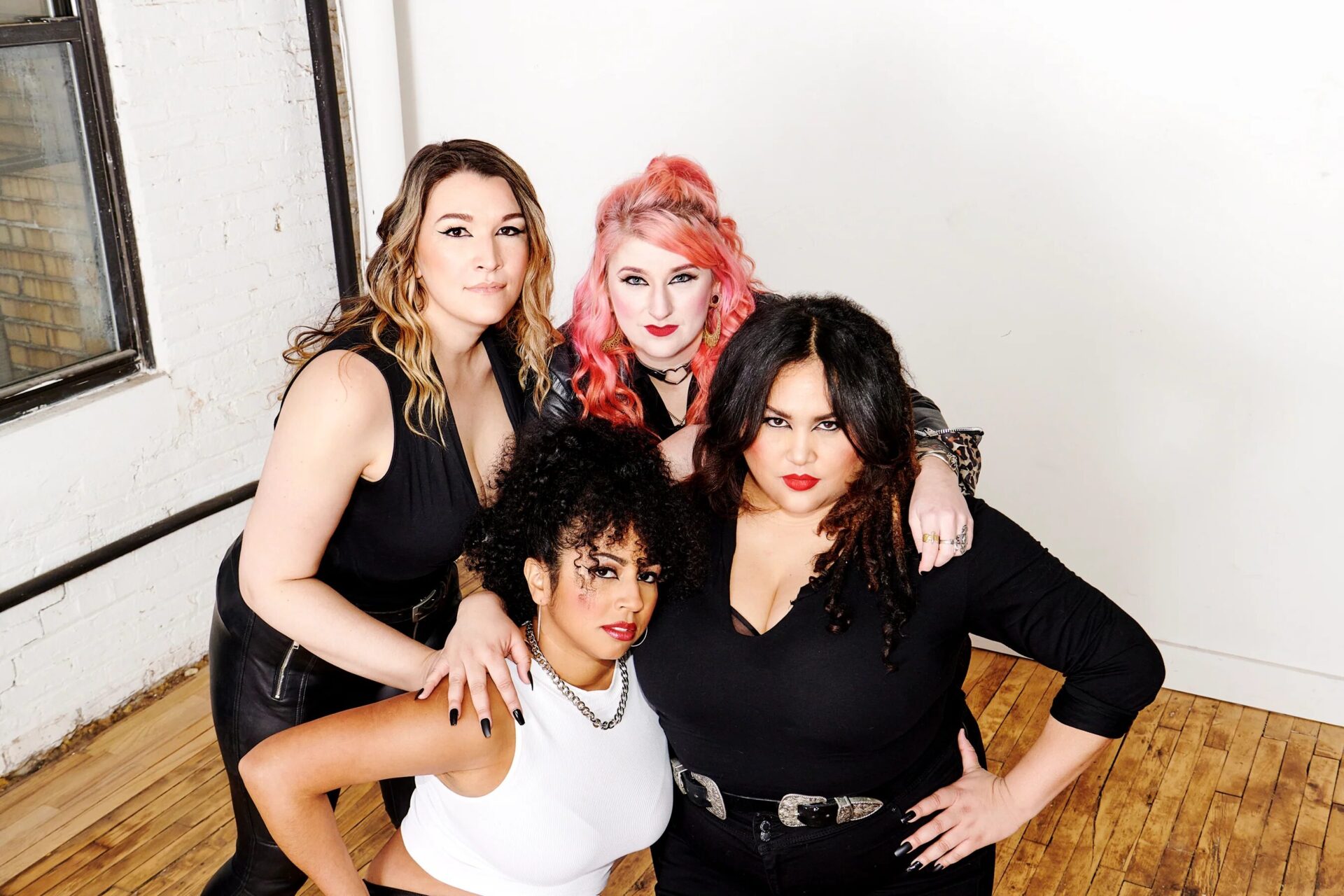INTERVIEW: Frida Kill at SXSW 2024
- Post Authorby Music director
- Post DateMon Apr 15 2024
BY: Claire Borgelt

Frida Kill is a brilliantly fierce feminist garage rock group from New York. Their debut album, Kill! Kill! combines frank, fiery lyricism with explosive guitar-driven instrumental for a modern take on the riot grrrl genre. We caught up with the band in Austin to discuss the importance of representation in creative spaces, the inspiration behind their music and where they got their start.
This interview has been edited for length and clarity.
So, what drew all of you to music initially? How did you first discover your passion for it?
Lily: Well, my whole family was in a church choir. My grandma was the choir director and my sisters and I all sang in the choir. I've played cello my whole life. Eventually, I realized that I had some aggression that needed an outlet, which is why I started playing rock and roll.
Maria: My dad was a singer. Gabby and I are cousins and our dads are both musically inclined. We also started singing in church when we were really little, and it kind of grew from there with angst and feeling misunderstood. We thought we should play music to get this stuff out.
Jeanette: My dad's a guitar player. I grew up in a house full of musical instruments. I spent a lot of years writing about music and photographing music. It was all-consuming. And finally, as an adult was I was like, ‘wait, maybe I want to learn to play guitar!” Now, here we are.
Gaby: I have been playing drums unofficially, for a while, but not in a band. This is my first band. It's been really fun. Maria and I used to jam together as kids and it just seemed like a good natural next move to start a band.
What do you feel drives you to make the music that you're making now?
Jeanette: I mean, I think we all have a lot of different influences. When you listen to the music, you can hear that we've all grown up listening to different things and have sort of different influences swirling around in our brain. I think ultimately, for all of us, Frida Kill is about having a platform and having our voices heard when it comes to the issues that are important to us.
Maria: I want to see how much we can explore our sound and express what our experiences have been. You know, the things that we're scared about, the things that we love. I want to put on a show and just like, let loose and go crazy, but I also want people to walk away thinking, ‘I'm so happy that they sang about these things, because we don't really get to talk about them all the time.'
Jeanette: I think there's a lot of empowerment in our music, whether we're singing about immigrant rights, trans rights, mental health issues, or even just partying. I think that a unifying thing of all of our songs is that we make empowering music.
Lily: Ultimately, we're just two guitars, bass and drums. I really like experimenting with which instrument is driving the song. It's really fun to get to play with the other three in this band, because we all have such different tastes and different tendencies and default settings when we do things. In the end though, I agree with what Jeanette said. I want a platform. I feel like there are a lot of things in my life that have made me feel as though I didn't have a voice. Getting to be in a band and have a microphone and be in front of an audience reminds me that I do have a voice. I can express my experience. It just means the world to me to feel like people want to hear that. I don't have to just go stand in the background playing the cello, anymore you know?
Gaby: I also think it's important to see more women of color playing music. When we play, we have so many people come up to us and say, ‘wow, that was great. We need more of that.' And I think that's also the driving force. It really is empowerment.
Jeanette: Representation is definitely important. When I was growing up most of my favorite bands were just white men with guitars. I still love some of those bands. But I feel like when you see people that look like you on stage, it's easier to imagine yourself doing that same thing.
And who were some of those people for you? Who were some of the performers that you could see yourself in growing up?
Jeanette: I grew up seeing a lot of like men in punk bands. There weren't a lot of women I was watching on stage. Women had behind-the-scenes roles, like interviewing and photographing bands. I did that for a really long time. Honestly, I think the Brooklyn music scene that we sort of came out of was maybe the most influential for me. There were so many awesome women in bands like Thick, The Rizzos, Bethlehem Steel and Hey, Baby. Seeing people who were my peers and friends write awesome music was sort of an aha moment for me.
Gaby: Bikini Kill obviously. And Le Tigre too, of course. Hole. Sonic Youth. All those ‘90s bands.
Lily: I love the ‘90s girls too, but I transitioned when I was like, 14 or something. There weren't a lot of trans people that were up on stage at the time. And, you know, I was liking Hedwig and the Angry Inch for the empowerment of that. As the conversation around trans identity and everything has evolved, you know, like we can understand that Hedwig was a good rock opera for the time but that it doesn't really express the experience of most trans people.Things like that were kind of all I had. But then I saw this band, Midnight Creeps, in some dingey place in Providence or Boston. I loved Jenny Hurricane. Like, she rocked and played some punk that I could relate to and appreciate. She isn't trans or anything, but I just really felt the empowerment of it. That changed me from being somebody that listened mostly to classical music, like the Muppets, to someone who listened to rock and roll. Music really helped me to start owning my feelings and made me feel like I had power in this world.
Maria: I think for me, it was when I finally saw Poly Styrene. I was like, ‘holy sh*t. I look like that lady.' That was really cool. Growing up, like we all said, it was always one type of person on stage. I thought, ‘I want to do that too, but I feel like no one's really gonna care or want to see me up there.' Then, our friend, Gwynn Galitzer, who's a singer and artist and the designer of our album cover, heard me sing at karaoke one time. She said, ‘why aren't you in a band?' She really helped me get out there. I really want to thank her for pushing me. You know, the X-ray Spex, Tina Turner, all those loud women in rock who are brown.
I also did want to chat about your album, Kill! Kill! It seems like you've been working on these songs for a long time. How do you feel that you've evolved over the course of your time as a band during the process of putting these together in their final form?
Maria: There's one song that I wrote when I was like, 24 as a poem for a mini zine. I feel like I'm being more and more vulnerable now. Which I was like, super scared of at first. I love being political, but it's also been really fun exploring the things that I'm afraid of and trying to turn them into, like, a fun disco song.
Lily: At first, this band was an outlet for stuff that I had been bottling in for a really long time. So I was kind of controlled by my emotions, and the expression of that was aggression. I was stealth about being trans for a really long time. For years I didn't want to tell anybody about it. I just bottled things in and kept pushing things down. I wanted to have grace and play it safe as much as I could. Eventually I just couldn't keep my mouth shut anymore. When I started externalizing it, that's when we got songs like “Get Over It.” Over time, I got some control over my feelings. I don't feel like I need to be aggressive like that anymore. And I don't feel like I need to be yelling to get these things out. I think it's actually more effective and feels more natural for me to express things in a more conversational way. Things have gotten softer for me. Maybe our second record is going to be more like that.
Jeanette: We started as a band in 2019. We had about six months of playing shows, and then the pandemic hit. We couldn't play – we were physically separated from each other. So, the songs that are on the first album had time to marinate. I'm extremely proud of that album. I'm extremely proud of what we were able to accomplish and how it all came together. But I think we're also all excited for the new songs that we're working on. The process is a lot faster now.
You do talk about a lot of your own experiences on the album. There's this really deep emotional connection to a lot of the things you're talking about.What's it like to play those songs live? How does it feel to put all of this stuff out there in front of an audience?
Maria: I think for me, when we have kids that have parents that are immigrants, to see them sing along to the songs and release this collective anger, it feels really good. A lot of those songs were driven by what was happening in the political climate at that time. I think we were all feeling that anger. To know that we share the same experience and can process together is great.
Jeanette: Our song “Camp for Nothing” was one that Maria came to practice with. The news cycle had been a brutal one. That one came together so fast.
Lily: I keep thinking about how we played a show opening for Destroy Boys. I remember this parent coming up to me. She had like, a 13 year old daughter hiding behind her legs. I'd talked about being trans on stage. This little 13 year old was just shyly looking at me, and her mom thanked me for talking about that stuff. I think about that kid a lot. I wish I knew her name. She's exactly the kind of person that I want to be up there for. We also had these other teenagers that started a band and like followed up with us afterwards. I can't wait to see what they come up with. I like to think of this as a rock and roll revolution. Let's all do this. Let's express ourselves. Let's create an intentional community around the music, which is ultimately about expressing what's going on inside your head and finding people that relate to you.
Frida Kill on Spotify:

